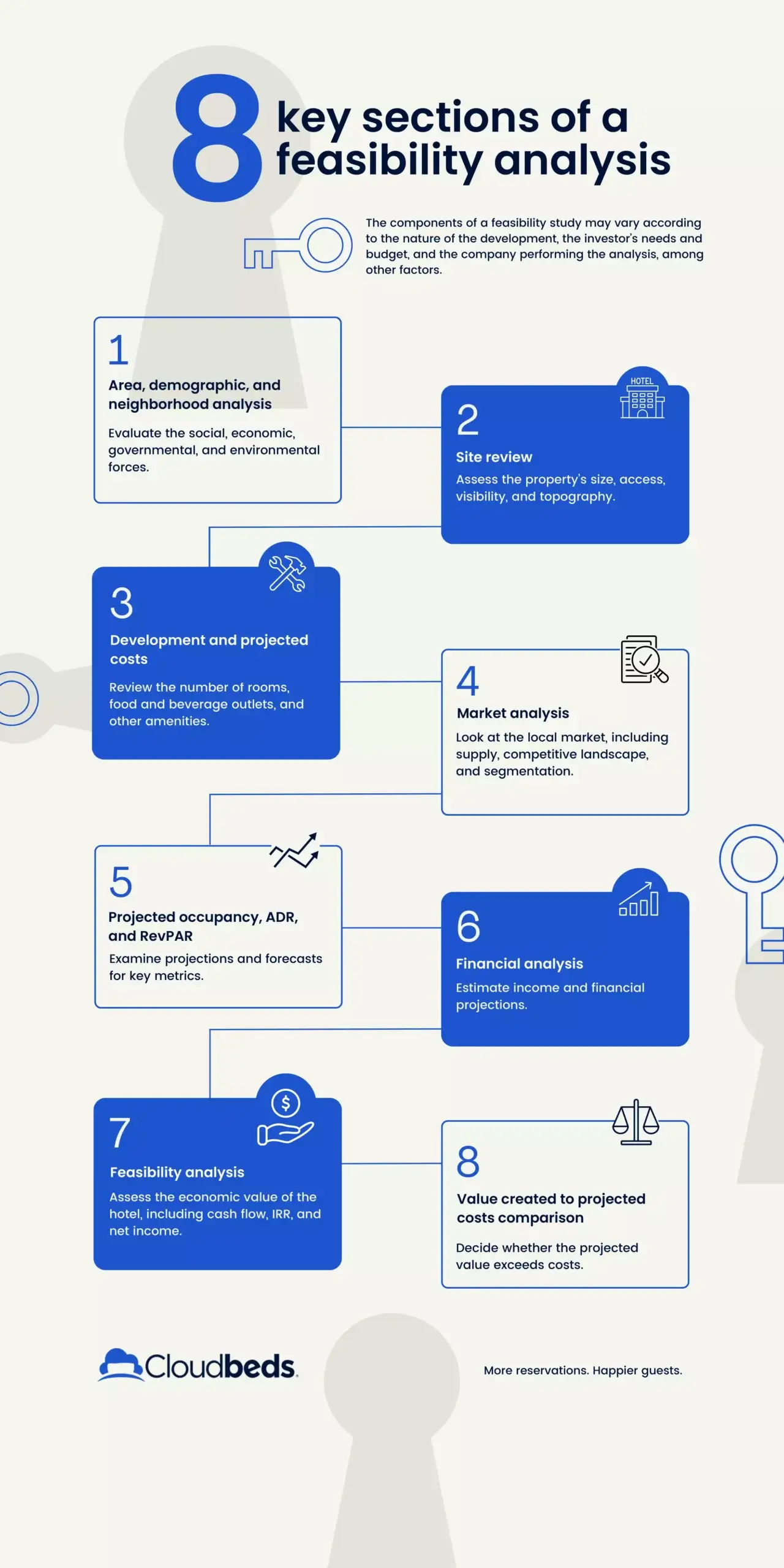Avoiding pitfalls: How a feasibility study
reduces risk for aspiring owners
Many people dream of owning their own lodging business, but the journey from that initial spark of inspiration to the grand opening day can be a long and involved process. Before investing in a new hotel, any wise entrepreneur will attest that you should first invest in a professional feasibility study. In fact, it may be a requirement for receiving financial support. And can save you from making a bad investment decision.
What exactly is a hotel feasibility study, and how can aspiring lodging owners conduct one? Here we explain why feasibility studies are so important, what information they should contain, and how a feasibility study works in practice. And as a special bonus, we provide a list of consultants who specialize in feasibility studies for the global lodging industry.
What is a hotel feasibility study?
A feasibility study is an analysis of a potential hotel project or takeover of an existing hotel to determine its potential as a sustainable and viable financial investment.
Typically, feasibility studies are performed by an external consultancy that specializes in analyzing and valuating hotel projects. In general, a project is deemed feasible if its projected economic value is estimated to be greater than its costs once completed and operational, generating the required return on investment (ROI). If the project is considered infeasible, pursuing it as an investor is likely not recommended.
A feasibility study analyzes:
- Location of the property
- Local market
- Competitive landscape
- Economic conditions
- Demographics
- Regulations
- Estimations for costs, revenue, and return on investment
Who is a feasibility study for?
Feasibility studies are prepared for various stakeholders in a hotel development project, including:
- Prospective owners and investors (the primary audience) – to help determine whether or not to go forward with the investment.
- Banks and lenders – to assess the development’s projected financial returns and decide whether or not to provide financing.
- Developers – to understand the development costs of the project and justify involvement.
- Operators – to determine the viability and scope of managing the hotel (although operators are often brought in after construction has begun).
Because different stakeholders have different criteria for evaluating the desirability of participating in a project, each stakeholder may require a separate or supplemental analysis.
Why is a feasibility study important?
A feasibility study is important because it provides an in-depth assessment of the potential viability of a proposed hotel before any significant investments are made. It is intended to reduce risks related to the investment.
For investors, emotions can get in the way of sound decision-making, especially when it comes to a project as exciting and complex as a hotel. If you’re new to the hotel industry and real estate development, it’s easy to overlook warning signs of potential obstacles ahead. A professional consultancy uses a predefined methodology to objectively assess the viability of the project, backed by research, data, and expertise.
How much does a feasibility study cost?
The pricing of a feasibility study will depend on the type of hotel and size, the project’s complexity, and the scope of the analysis. Generally, investors can expect to pay anything from a few thousand dollars for a small project to tens of thousands for a larger one.
8 key sections of a feasibility analysis
The components of a feasibility study may vary according to the nature of the development, the investor’s needs and budget, and the company performing the analysis, among other factors. Below is a summary of the main components of a hotel feasibility study, according to Hotel & Leisure Advisors.
Area, demographic, and neighborhood analysis. A location analysis and evaluation of the social, economic, governmental, and environmental forces that will influence the project’s performance, including demographics, market feasibility, and demand generators like nearby attractions in the local areas.
Site review. An assessment of the property’s size, access, visibility, topography, and other attributes. This may include its proximity to highways and amenities and government impacts such as zoning restrictions and environmental regulations.
Proposed development recommendations and costs. A review of the scope of the development and projected costs, with guidance on the number of guestrooms, food & beverage outlets, function spaces, recreational amenities, retail, spa, and other amenities, as well as branding recommendations (I.e., independent hotel, franchise, or another model).
Market analysis. A market study of the local accommodation market, including metrics like average occupancy rates, average daily rate (ADR), and revenue per available room (RevPAR) among hotel supply in the area, as well as the competitive landscape, market segmentation, and market penetration.
Proposed development occupancy and ADR. An analysis of supply and demand in the market, as well as projected room rates, occupancy, ADR, and RevPAR forecasts for the property itself.
Financial analysis. An estimate of the property’s capacity to generate income and its financial projections, including gross revenues, operating costs, and net operating income.
Feasibility analysis. An estimation of the economic value of the hotel, including a cash flow analysis, internal rate of return (IRR), projected net income in future years, and the potential sale price in the future.
Comparison of value created to projected costs. An assessment of whether the projected value created by the property equals or exceeds the development cost for the proposed project.

Hotel feasibility study example
So, what does a feasibility study look like in practice? Let’s imagine you found what appears to be the ideal property to construct your hotel. The property is up for sale, and after conducting some hotel market research of your own, you decide to hire a hotel consultancy to conduct a feasibility study. (Keep scrolling for a list of consulting firms).
Six weeks later, the study is complete. Here’s a summary of the key findings:
- The property is located on the edge of town but in an up-and-coming neighborhood with significant growth potential in the coming years.
- The site is located just off a main highway that leads to downtown to the south and a popular mountain resort area to the north, with partial views of the mountains, city, and the nearby river.
- There are four other hotels within a five-mile radius, all of which are three- or four-star properties either franchised or managed by well-known hotel brands.
- Several large corporations are based in the market area, as well as a shopping district and numerous restaurants but no attractions. A large office complex is slated to start development next year across the street.
- Given the size of the lot, inbound traveler demographics, and the current competitive landscape, the consultancy feels that an independent boutique hotel (50 to 75 rooms) with a stylish restaurant and bar, 5,000 square feet of function space, and a fitness room (but no pool) would fill a void in the local market.
- Based on the financial forecasts, the consultant estimates that the hotel could be profitable within five years of opening and could expect a solid return on investment if sold in 10 to 15 years.
Overall, the project is assessed as highly feasible, although not without risks, and barring any unexpected changes to the economy, building costs, or market demand. Now it’s up to you to decide if you want to take the next step on your journey to ownership and consult a bank about financing.
7 leading feasibility studies consultants
Considering the amount of money at stake, it’s vital to carefully vet consulting firms to find a highly knowledgeable, experienced, and reputable professional to conduct a feasibility study on your behalf. To help, below is a roundup of well-known consultancies that specialize in the hotel & resort industry.
1. HVS
Headquartered in Johnstown, Colorado, USA, HVS bills itself as the only global consulting firm focused exclusively on the hospitality industry, with over 50 offices worldwide.
2. IHCS
With its head office in Bocholt, Germany, IHCS provides a range of consulting services to hotels and resorts around the world, from feasibility studies to marketing strategy.
3. PKF Hospitality Group
With a track record dating back to 1869, PKF Hospitality Group is the pioneer in Customer Success Management. Headquartered in Vienna, Austria, the company has a global team of over 100 consultants in 15 countries.
4. H&LA
Hotel & Leisure Advisors (H&LA) is a boutique firm based in Lakewood, Ohio, USA, with a track record of analyzing and preparing studies for more than 3,000 properties in Canada, the Caribbean, and every state in the U.S.
5. RDC
Based in Boca Raton, Florida, USA, Resort Development Consultants (RDC) provides a specialized range of advisory and consulting services to the hospitality, real estate, and tourism industries.
6. Cayuga Customer Success Managers
With its head office in Sarasota, Florida, USA, Cayuga Customer Success Managers provides expert guidance to the hotel, resort, tourism, and related industries in 100 countries.
7. Integra Hotels
Based in National, California, USA, Integra is the largest independent commercial real estate valuation, counseling, and advisory services firm in the U.S. and the Caribbean.



















